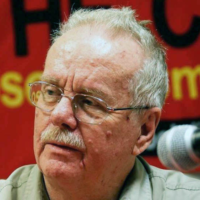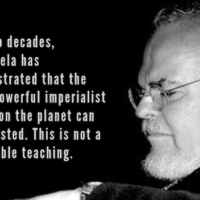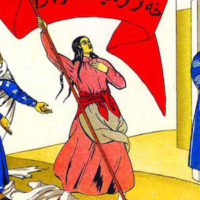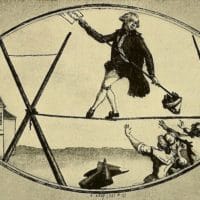-
Catastrophe capitalism: climate change, COVID-19, and economic crisis
Obviously, the situation associated with the sudden appearance of the SARS-CoV-2 virus and the COVID-19 pandemic is grim all over the world. Both the causes and the consequences are closely related to capitalist social relations.
-
Ecosocialism or barbarism: an interview with Ian Angus
In an interview with roape.net, ecosocialist and writer Ian Angus discusses the environmental crisis, the Anthropocene and Covid-19. He argues that new viruses, bacteria and parasites spread from wildlife to humans because capital is bulldozing primary forests, replacing them with profitable monocultures. Ecosocialists must patiently explain that permanent solutions will not be possible so long as capital rules the Earth.
-
The role of intellectuals in the Bolivarian Revolution: A conversation with Luis Britto Garcia
Venezuela’s most acclaimed contemporary writer talks about the Bolivarian Revolution and its dialectical relation with cultural producers.
-
Talking Lenin with Tariq Ali – II
Raza Naeem sat down with one of the most influential leftists of our world today to discuss politics, history and his new book
-
Talking Lenin with Tariq Ali – I
Raza Naeem sat down with one of the most influential leftists of our world today to discuss politics, history and his 2017 book
-
The rise of AI-Capitalism: An interview with Nick Dyer-Witheford
The political answer is not acceleration but refusal. And this is indeed what is has begun to manifest, in a variety of social rebellions. This includes the strikes of gig economy labor, the protests of Silicon Valley tech workers, anti-surveillance movements, urban protests against the smart city, defections from social media sites, algorithmic-bias busting, and “techlash” against the oligopolistic concentration of digital powers.
-
How global agriculture grew a pandemic
What are the underlying structural reasons for the coronavirus outbreak? According to Monthly Review Press author Rob Wallace, you have to look at global agriculture if you really want to understand the nature of global outbreaks.
-
“Capitalism is a disease hotspot”
The real danger of each new outbreak is the failure or—better put—the expedient refusal to grasp that each new Covid-19 is no isolated incident. The increased occurrence of viruses is closely linked to the proliferation of capitalist food production and distribution.
-
Marx’s ‘Capital’ as a literary experience
Columbia University PhD candidate in English and Comparative Literature Tiana Reid finds that her students benefit from reading volume one of Karl Marx’s “Capital.” “There are so many literary wsys to read it, which I don’t think blunt the more radical political reading,” said Reid, who conducts research in Black Studies, Marxism and feminism.
-
Lebanon is a severe case of subordinate financialization that must avoid the IMF
To me, the Lebanese crisis looks like, in the first instance, as a foreign exchange and international transactions crisis, a classic developing country crisis in the era of financialisation. As such it is closely connected to the country’s policy on the exchange rate. The fixed peg policy chosen by the Lebanese ruling class and operated by the central bank and the government for a long time, has proven destructive. The country’s economy is under great pressure because the strong pound has damaged Lebanese competitiveness on an international scale and facilitated the growth of domestic credit.
-
Remembering the heroism of activist Berta Cáceres four years after her assassination: An interview with her daughter
On July 15, 2013, the Civic Council of Popular and Indigenous Organizations of Honduras (COPINH), led by Berta Cáceres Flores, went to protest the construction of a hydroelectric dam on the Gualcarque River. This river, in western Honduras, is considered to be sacred by the indigenous Lenca community. No one from the company that wanted to build the dam had talked to the Lenca.
-
Beyond the Permanent State of Emergency
Not long before the Twin Towers fell, the Italian philosopher Giorgio Agamben resurrected a concept anathema to the liberal notion of progress—the idea that unrelenting crisis is not necessarily exceptional. Agamben employed the image of “the Camp” to describe the space and time “when the state of exception begins to become the rule.”
-
‘This is an apocalyptic future that we’re facing’
CounterSpin interview with Karl Grossman on the weaponization of space.
-
Isabelle Garo on Marx’s strategic thought and the spirit of revolt
The present context in France and across the world is quite bad for the exploited and oppressed in general, as also for the organised workers’ movement. This long term weakening in the conditions of capitalist crises gave the green light to the ruling classes to take out their revenge at the end of the 1970s and wind back the limited but real social gains of the post-war period.
-
A murderous system is being created before our very eyes
A made-up rape allegation and fabricated evidence in Sweden, pressure from the UK not to drop the case, a biased judge, detention in a maximum security prison, psychological torture–and soon extradition to the U.S., where he could face up to 175 years in prison for exposing war crimes. For the first time, the UN Special Rapporteur on Torture, Nils Melzer, speaks in detail about the explosive findings of his investigation into the case of Wikileaks founder Julian Assange.
-
Cornel West interview
Let’s begin with Prophesy Deliverance. What you do in this book is incredible. You draw from Martin Luther King, Malcolm X, then the famous Afro-centrist Professor James E. Cohn, and then the pragmatic tradition with which you were already familiar while you were doing PhD work at Princeton. Then you put them together and, much more importantly, you also do something extraordinary.
-
Democracy: when the opposition is the Media
One more court case has been opened against the former Ecuadorian president, Rafael Correa. The elite with the help of the corporate media are trying to get him behind bars. Also, a council has been created, by the executive, to control the judiciary, proving that there is no impartial process for the victims of lawfare.
-
From a dysfunctional world order to a sustainable future: an interview with Richard Falk
In the interview that follows, Richard Falk, an internationally-renowned scholar of Global Politics and International Law, offers his insights on the contemporary state of world politics and shares his radical vision of the future world order.
-
Ecological Revolution
John Foster gives a radio interview on Ecological Revolution
-
Expert Q&A: Trump’s executive order on campus antisemitism
Last week, President Donald Trump issued an executive order requiring federal agencies to use a definition of antisemitism that conflates criticism of Israel with antisemitism when investigating civil rights complaints alleging antisemitism on campus.




















